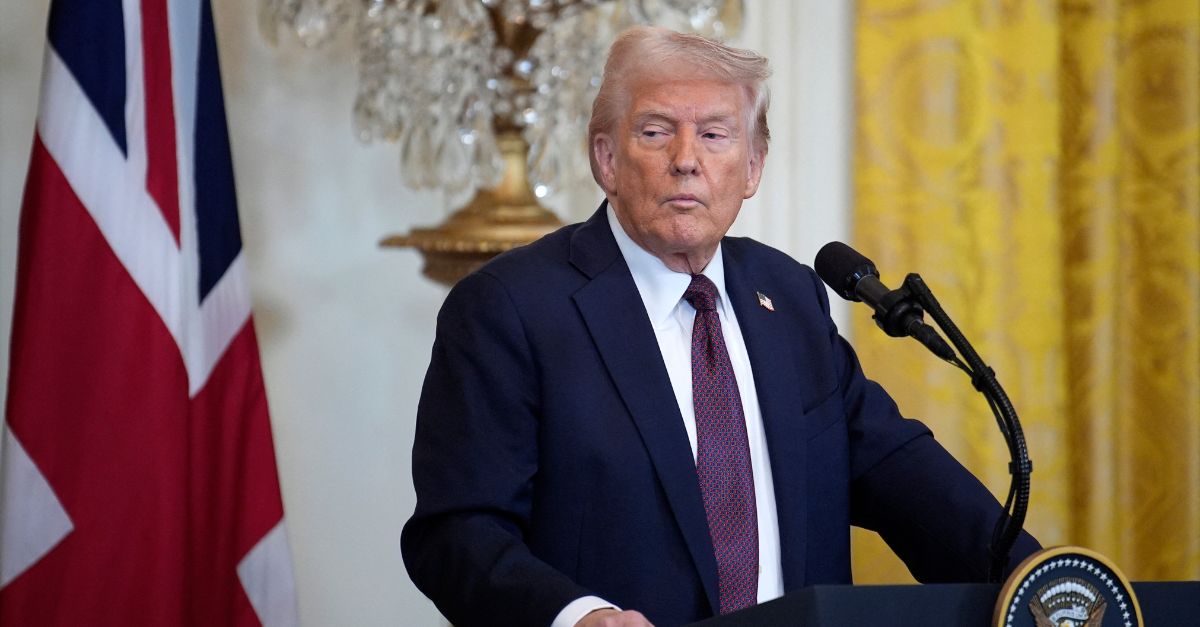
President Donald Trump at a press conference at the White House in Washington on February 27, 2025 (Yuri Gripas/Abaca/Sipa USA; via AP Images)
A lawyer representing the Trump administration faced tough questioning from a judge during oral arguments about the planned transgender ban on service members at the Pentagon.
Circuit Judge Cornelia T.L. Pillard, an appointee of Barack Obama, openly questioned arguments presented by U.S. Department of Justice attorney Jason Manion.
Judge Pillard did not hold back, showing clear skepticism towards the government’s stance right from the beginning of the hearing. “How can you say that?” she asked the DOJ attorney, clearly disagreeing with their perspective.
Manion, for his part, is no stranger to judicial dressing-downs.
On Jan. 28, Nicolas Talbott and several others filed their complaint with the U.S. District Court for the District of Columbia. The lawsuit alleges the ban on transgender service members violates the Due Process clause of the Fifth Amendment by discriminating against people “based on their sex” and “their transgender status.”
On March 12, U.S. District Judge Ana C. Reyes, a Joe Biden appointee, mercilessly lambasted Manion and other DOJ counsel for what she saw as problems with their basic competence, middling legal analysis, lack of preparation, intellectual honesty, and more.
On March 19, Reyes issued a scathing order granting a preliminary injunction halting the policy. She said the ban was “soaked in animus and dripping with pretext” and found it unconstitutionally violated equal protection laws by discriminating based on sex and status.
On Tuesday, the government aimed to overturn the district court’s ruling by beginning with an argument that Reyes had, quite simply, far overstated what the Pentagon’s planned-but-paused policy would do.
“This policy, like the policies that every other administration in the last 10 years or so has done, focused on a medical condition and related medical treatments, focused on gender dysphoria and it focused on medical treatments related to that condition,” Manion said. “It was just clearly erroneous for the district court to treat this policy as being a broader policy than it was.”
The outspoken judge rejected that characterization.
“How can you say that? Pillard asked. “When somebody who has no medical condition — somebody who has never been diagnosed with gender dysphoria but who has transitioned and who lives in a sex other than their birth sex — is explicitly banned by the policy? It’s clearly banning all transgender persons.”
The DOJ attorney again pushed back.
“Each of the policies that existed before — and this policy as well — allow people who identify as something other than their sex to serve in their sex,” Manion told the court.
For a while, the judge and the lawyer sparred over definitions used by experts cited by both the government and the transgender service member plaintiffs — about who qualifies as transgender, and what transitioning might mean, in terms of the proposed ban.
“Your argument that this is not a ban on transgender service is that you can serve as a transgender person as long as you don’t serve as a transgender person,” Pillard said, pressing Manion on the point.
“I certainly wouldn’t put it that way,” the attorney said.
The government’s lawyer went on to say the policy “targets a subset” of transgender individuals — specifically those who are diagnosed with gender dysphoria. This diagnosis, Manion ventured, comes with “significant clinical distress” and “impairment of functioning” in “important areas.”
Two other judges on the three-judge panel in the D.C. Circuit, Gregory G. Katsas and Neomi Rao, largely kept their thoughts to themselves and did not ask nearly as many questions as Pillard.
Katsas, however, did interject when Manion brought up an argument about the standard of review. The attorney said the equation for the appellate court was not a typical question about transgender rights because the military is involved, which places the issue as more of a question about executive power than the constitutional rights of a group.
Rao quickly followed up to steer the DOJ attorney toward why the appellate court might be able to reject the lower court’s findings of fact that the policy is motivated by animus.
“Even if you are required to defer to the factual view that there was some animus motivating this decision, I don’t think it resolves the legal question of whether you can shortcut the deference that would normally apply to this decision.” Manion essayed.
The woman chosen by President Donald Trump to fill the seat vacated by Justice Brett Kavanaugh seemed a bit surprised by this answer.
“Are you conceding that there was animus?” Rao answered.
The government lawyer answered in the negative.
“It’s certainly clear error to find that the policy can’t be explained by any reason other than animus,” Manion went on. “The relevant question is whether the policy can be explained by any reason other than animus.”
Love true crime? Sign up for our newsletter, The Law&Crime Docket, to get the latest real-life crime stories delivered right to your inbox.
The DOJ lawyer reiterated previous in-court and motions arguments that the 2018 U.S. Supreme Court case of Trump v. Hawaii is controlling.
In that case, the nation’s highest court discounted concerns about anti-Muslim or anti-Islam bias when upholding the constitutionality of the first Trump administration’s travel ban, which almost entirely targeted Muslim-majority countries. Despite Trump calling the policy a “Muslim ban” during his 2016 presidential campaign, the majority looked to, and credited, the text of the policy itself instead of Trump’s verbiage.
On Tuesday, Pillard refused to countenance the comparison, noting that the high court also credited the travel ban for covering a tiny amount of the global Muslim population and for being enacted based on “careful study” from counterterrorism experts.
“Here we have something altogether different,” the judge said. “We have a sitting president issuing an executive order that has animus on its face, not directing anyone, any panel of experts, to study this issue, but simply directing the Secretary of Defense to implement a ban on transgender — on service by transgender persons,” Pillard said. “And within a month, the Secretary of Defense doing so with no further study.”








